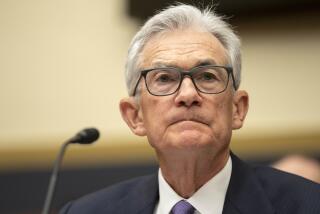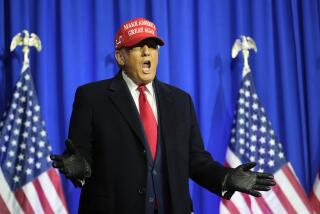Trump’s latest Fed choices are a longtime monetary dove and a onetime gold bug
After a yearlong assault on the Federal Reserve and its chairman, President Trump has tapped two wildly different economists to the central bank’s board who seemingly have one important thing in common.
They’re both likely to support the president’s call for lower interest rates.
One, Christopher Waller, is largely a conventional choice. Drawn from within the Fed’s own ranks, he’s been consistent in his calls for a more dovish approach over the years. The other, Judy Shelton, has spent decades outside mainstream economics and recently appears to have completed a metamorphosis from proponent of returning to the gold standard — a concept broadly espoused by those who feel monetary policy is too lax — to an advocate of the need for more stimulus.
“It seems like both are going to be in favor of lower rates, and sooner rather than later,” said Kathleen Bostjancic, an economist at Oxford Economics in New York. “They are much more dovish, and obviously that’s what President Trump wants.”
Waller is director of research for St. Louis Federal Reserve Bank President James Bullard, who was the only vote in favor of a rate cut at the Fed’s meeting in June. Shelton, who has been an informal advisor to Trump, has publicly said the central bank should reduce rates.
Trump, who announced his picks within minutes of each other on Twitter on Tuesday, has recently struggled to find candidates for the Fed that are acceptable to senators who must confirm nominees. The president previously advanced four people for the two remaining open seats on the Board of Governors. None of them made it, raising questions about the White House vetting process for his picks.
“It was a great pleasure to meet with the president this afternoon,” Shelton said in an email on Tuesday night. “This president really gets it. His pro-growth economic agenda should not be undermined by wrongheaded ‘Phillips Curve’ thinking that punishes productive economic growth and subverts continued gains while turning a blind eye to the currency impact of ‘additional stimulus measures’ by other central banks. We have high employment and low inflation; so much for the supposed trade-off.”
The Phillips curve holds that there’s an inverse relationship between unemployment and inflation.
The lengthy Senate confirmation process means neither candidate is likely to join the board for months, perhaps not even until next year. Current Vice Chairman Richard Clarida’s nomination was announced April 18, 2018, and he wasn’t sworn in until Sept. 17. Governor Michelle Bowman, nominated the same day as Clarida, didn’t take office until Nov. 26.
As a high-ranking Fed staffer, Waller may have a better chance of passing muster with lawmakers than some of Trump’s previous contenders. As for Shelton, the Senate has already confirmed her in her current role as the U.S. executive director for the European Bank for Reconstruction and Development. Her unorthodox views, though, could attract opposition.
In an interview with Bloomberg in May, she said she was “highly skeptical” that the goals for the Fed set by Congress — the pursuit of maximum employment, stable prices and moderate long-term interest rates — were relevant.
The White House has conducted the search for Fed candidates as Trump has repeatedly blasted Fed Chairman Jerome H. Powell over the Fed’s interest rate increases. The president has told confidants that he believes he has the authority to replace Powell as Fed chairman, demoting him to the level of board governor, according to people familiar with the matter. But Trump said he doesn’t plan to do it. The president chose Powell as chairman, replacing Janet Yellen last year.
Trump’s eagerness to get rid of Powell makes both of these nominees potential chairs-in-waiting, a factor that may also affect their confirmation process in the Senate. Powell has said he intends to serve his full four-year term and that “the law is clear” on that issue.
Earlier this year, Trump advanced two supporters for the Fed board, Stephen Moore and Herman Cain, but both withdrew their names after they came under criticism.
Waller, who declined to comment Tuesday on his nomination, has a doctorate in economics and previously served as a professor of economics at the University of Notre Dame before joining the St. Louis Fed in 2009. His key research focus has been on monetary and macroeconomic theory and the political economy.
Waller was approached by the White House last month about the job and met with Trump on Tuesday, said Karen Branding, a spokeswoman for the St. Louis Fed.
The overture came after the White House talked to his boss, Bullard, about joining the Fed Board of Governors himself. But Bullard told reporters last month that he’s happy in his current position.
The two men are close and have coauthored monetary policy papers. Waller shares, and helped to develop in 2016, Bullard’s dovish view that policy is in a new regime in a world with low inflation and high savings — where higher interest rates are not needed.
“We didn’t see any overheating in the economy coming, and so the question was, why are we raising rates?” Waller recalled in a June interview with Bloomberg. “We didn’t see any reason to raise rates just for the sake of raising rates.”
Waller also said that he doesn’t worry about pushing the unemployment rate too low and sparking higher prices. “We don’t buy into the Phillips curve story that low unemployment causes inflation. Look at Japan,” he said.
Shelton has a doctorate in business administration from the University of Utah with an emphasis on finance and international economics. She previously worked for the Sound Money Project, which was founded to promote awareness about monetary stability and financial privacy.
In her interview with Bloomberg in May, Shelton questioned the use of the Fed’s basic interest rate tool to adjust the price of money and thereby guide an economy toward a sustainable level of growth.
“A Fed that is too eager to artificially put in an interest rate that isn’t close to what the market would be suggesting is not so good,” she said at the time. “I would try to be the voice saying, ‘Are you sure you know better than the markets?’”
Shelton has also in the past argued for a return to a gold standard, fixing the value of the dollar to a weight of gold, a system the U.S. followed to varying degrees until 1976. If appointed to the Fed, however, Shelton said she would not call for a return to the gold standard or for a sudden abandonment of other established policies.
After raising interest rates last year in the face of criticism from Trump, Powell and fellow Fed colleagues are widely expected to cut rates at their next meeting at the end of this month.






